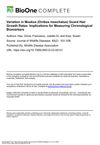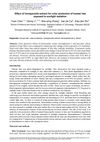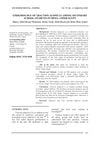 25 citations,
May 2019 in “Heliyon”
25 citations,
May 2019 in “Heliyon” Hair treatments cause significant structural changes, especially with excessive heat, regardless of ethnicity.
 24 citations,
September 1985 in “Journal of The American Academy of Dermatology”
24 citations,
September 1985 in “Journal of The American Academy of Dermatology” The report suggests a possible link between hair loss and hidden scalp tumors but states more evidence is needed to confirm this.
 November 2023 in “International Journal of Women's Dermatology”
November 2023 in “International Journal of Women's Dermatology” Hormone replacement therapy may improve hair growth in the frontal hairline of postmenopausal women with hair loss.
 1 citations,
July 2015 in “The European research journal”
1 citations,
July 2015 in “The European research journal” Stopping aripiprazole can reverse its side effect of hair loss.
 350 citations,
June 1989 in “The American Journal of Medicine”
350 citations,
June 1989 in “The American Journal of Medicine” Itraconazole is potentially effective for treating invasive aspergillosis, but more research is needed.
 54 citations,
September 2012 in “Dermatologic Clinics”
54 citations,
September 2012 in “Dermatologic Clinics” Some medications can cause hair loss, but stopping the drug usually leads to recovery within 3 months.
 7 citations,
August 2018 in “Journal of cosmetic dermatology”
7 citations,
August 2018 in “Journal of cosmetic dermatology” Chemical hair straightening improves smoothness and shine but may cause side effects, suggesting a need for safer methods.
 April 2024 in “Journal of wildlife diseases”
April 2024 in “Journal of wildlife diseases” Muskox hair growth rates vary widely, so a single growth rate can't be used for all populations.
 53 citations,
April 2018 in “Journal of The American Academy of Dermatology”
53 citations,
April 2018 in “Journal of The American Academy of Dermatology” Cancer treatments often cause hair disorders, significantly affecting patients' quality of life, and better management methods are needed.
 34 citations,
November 2013 in “Breast Cancer Research and Treatment”
34 citations,
November 2013 in “Breast Cancer Research and Treatment” Aromatase inhibitor therapy for breast cancer increases the risk of hair loss and thinning.
 29 citations,
September 2012 in “Dermatologic Clinics”
29 citations,
September 2012 in “Dermatologic Clinics” Hair disorders are caused by a complex mix of biology, genetics, hormones, and environmental factors, affecting hair growth and leading to conditions like alopecia.
 21 citations,
July 2014 in “British Journal of Dermatology”
21 citations,
July 2014 in “British Journal of Dermatology” Hair thickness matters more than density for baldness in Japanese men over 25.
 18 citations,
January 2007 in “Pharmaceutical Biology”
18 citations,
January 2007 in “Pharmaceutical Biology” Citrullus colocynthis extract is effective for hair growth, comparable to minoxidil.
 11 citations,
January 2004 in “Exogenous dermatology”
11 citations,
January 2004 in “Exogenous dermatology” Outside factors like grooming, chemicals, and the environment can damage hair and cause disorders.
 5 citations,
July 2003 in “Pediatric Critical Care Medicine”
5 citations,
July 2003 in “Pediatric Critical Care Medicine” Most patients experience temporary hair loss after ECMO, but it usually grows back within 6 months without treatment.
 1 citations,
January 2017 in “Clinical approaches and procedures in cosmetic dermatology”
1 citations,
January 2017 in “Clinical approaches and procedures in cosmetic dermatology” Hair can't be reliably repaired once damaged; prevention and proper product use are key to maintaining hair health.
 January 2017 in “International journal of clinical & experimental dermatology”
January 2017 in “International journal of clinical & experimental dermatology” Eating a balanced diet with vitamins, micronutrients, and antioxidants is important for hair health and can help with hair loss.
 January 2017 in “Clinical approaches and procedures in cosmetic dermatology”
January 2017 in “Clinical approaches and procedures in cosmetic dermatology” Cosmetic procedures can harm hair, but damage can be minimized with knowledge and care; however, once hair is damaged, it cannot be reliably repaired.
 1 citations,
July 2016 in “British Journal of Dermatology”
1 citations,
July 2016 in “British Journal of Dermatology” Men with a certain type of hair loss often use facial moisturizers, and a specific antibiotic treatment may help another hair condition.
 83 citations,
November 2002 in “British Journal of Dermatology”
83 citations,
November 2002 in “British Journal of Dermatology” Low iron levels are not directly linked to chronic hair loss and iron supplements may not help.
 6 citations,
September 2013 in “Advanced materials research”
6 citations,
September 2013 in “Advanced materials research” Non-ionic silicone emulsion best protects hair color from sunlight.
 7 citations,
January 2017 in “Journal of cosmetology & trichology”
7 citations,
January 2017 in “Journal of cosmetology & trichology” Good nutrition is crucial for healthy hair and can help with hair loss without medication.
 56 citations,
January 2013 in “International journal of trichology”
56 citations,
January 2013 in “International journal of trichology” Zinc supplements may be needed to treat hair loss in hypothyroidism.
 9 citations,
July 2022 in “Cell reports”
9 citations,
July 2022 in “Cell reports” Sox2 controls hair color by affecting pigment production in hair follicles.
 3 citations,
September 2019 in “Journal of Orthodontics”
3 citations,
September 2019 in “Journal of Orthodontics” A boy's hair grew back after he stopped using orthodontic headgear that caused temporary hair loss.
 1 citations,
June 2023 in “Journal of Cosmetic Dermatology”
1 citations,
June 2023 in “Journal of Cosmetic Dermatology” Exosome treatment for hair growth is promising but not FDA-approved and needs more research on safety and how it works.
 September 2023 in “Ain Shams medical journal”
September 2023 in “Ain Shams medical journal” 31% of female high school students in Minia have hair loss from tight hairstyles, which can become permanent if not treated early.
 5 citations,
February 2022 in “Acta Biomaterialia”
5 citations,
February 2022 in “Acta Biomaterialia” Nanomaterials can improve hair care products and treatments, including hair loss and alopecia, by enhancing stability and safety, and allowing controlled release of compounds, but their safety in cosmetics needs more understanding.

Photobiomodulation improves the quality of life for people with hair loss.
 October 2023 in “Journal of cosmetic dermatology”
October 2023 in “Journal of cosmetic dermatology” Timely treatment and prevention are crucial to avoid serious complications in hair transplants.






























